February 14, 2000
美国节日
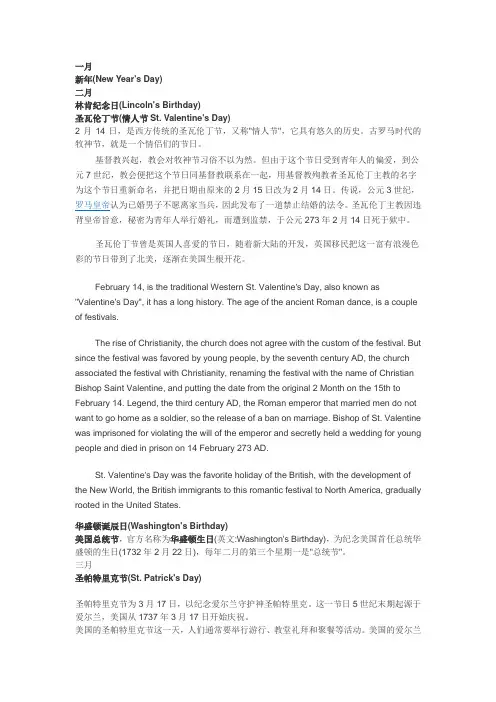
一月新年(New Year's Day)二月林肯纪念日(Lincoln's Birthday)圣瓦伦丁节(情人节St. Valentine's Day)2月14日,是西方传统的圣瓦伦丁节,又称"情人节",它具有悠久的历史。
古罗马时代的牧神节,就是一个情侣们的节日。
基督教兴起,教会对牧神节习俗不以为然。
但由于这个节日受到青年人的偏爱,到公元7世纪,教会便把这个节日同基督教联系在一起,用基督教殉教者圣瓦伦丁主教的名字为这个节日重新命名,并把日期由原来的2月15日改为2月14日。
传说,公元3世纪,罗马皇帝认为已婚男子不愿离家当兵,因此发布了一道禁止结婚的法令。
圣瓦伦丁主教因违背皇帝旨意,秘密为青年人举行婚礼,而遭到监禁,于公元273年2月14日死于狱中。
圣瓦伦丁节曾是英国人喜爱的节日,随着新大陆的开发,英国移民把这一富有浪漫色彩的节日带到了北美,逐渐在美国生根开花。
February 14, is the traditional Western St. Valentine's Day, also known as "Valentine's Day", it has a long history. The age of the ancient Roman dance, is a couple of festivals.The rise of Christianity, the church does not agree with the custom of the festival. But since the festival was favored by young people, by the seventh century AD, the church associated the festival with Christianity, renaming the festival with the name of Christian Bishop Saint Valentine, and putting the date from the original 2 Month on the 15th to February 14. Legend, the third century AD, the Roman emperor that married men do not want to go home as a soldier, so the release of a ban on marriage. Bishop of St. Valentine was imprisoned for violating the will of the emperor and secretly held a wedding for young people and died in prison on 14 February 273 AD.St. Valentine's Day was the favorite holiday of the British, with the development of the New World, the British immigrants to this romantic festival to North America, gradually rooted in the United States.华盛顿诞辰日(Washington's Birthday)美国总统节,官方名称为华盛顿生日(英文:Washington's Birthday),为纪念美国首任总统华盛顿的生日(1732年2月22日),每年二月的第三个星期一是"总统节"。
大学英语第三学期句子翻译
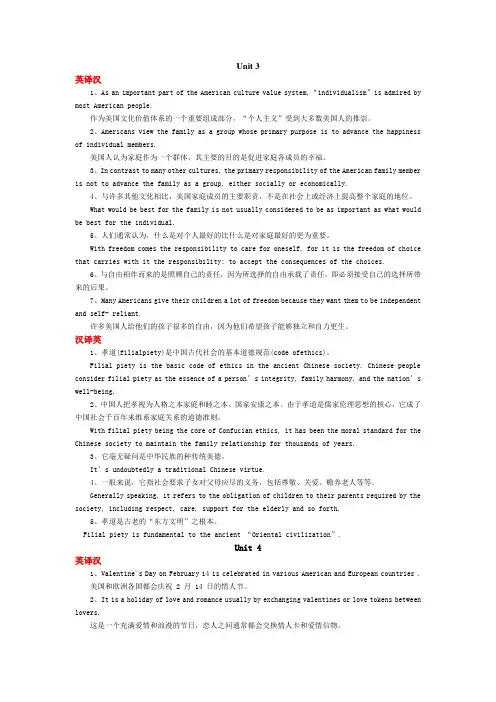
Unit 3英译汉1、As an important part of the American culture value system,“individualism”is admi red by most American people.作为美国文化价值体系的一个重要组成部分,“个人主义”受到大多数美国人的推崇。
2、Americans view the family as a group whose primary purpose is to advance the happiness of individual members.美国人认为家庭作为一个群体,其主要的目的是促进家庭各成员的幸福。
3、In contrast to many other cultures, the primary responsibility of the American family member is not to advance the family as a group, either socially or economically.4、与许多其他文化相比,美国家庭成员的主要职责,不是在社会上或经济上提高整个家庭的地位。
What would be best for the family is not usually considered to be as important as what would be best for the individual.5、人们通常认为,什么是对个人最好的比什么是对家庭最好的更为重要。
With freedom comes the responsibility to care for oneself, for it is the freedom of choice that carries with it the responsibility: to accept the consequences of the choices.6、与自由相伴而来的是照顾自己的责任,因为所选择的自由承载了责任,即必须接受自己的选择所带来的后果。
重要节日英语翻译
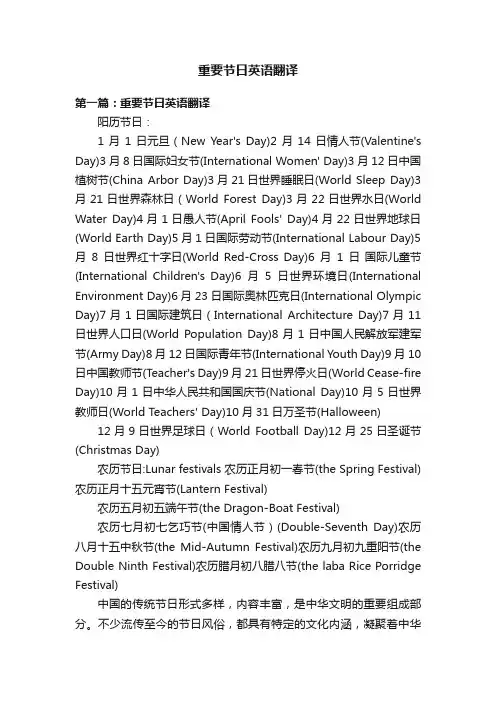
重要节日英语翻译第一篇:重要节日英语翻译阳历节日:1月1日元旦(New Year's Day)2月14日情人节(Valentine's Day)3月8日国际妇女节(International Women' Day)3月12日中国植树节(China Arbor Day)3月21日世界睡眠日(World Sleep Day)3月21日世界森林日(World Forest Day)3月22日世界水日(World Water Day)4月1日愚人节(April Fools' Day)4月22日世界地球日(World Earth Day)5月1日国际劳动节(International Labour Day)5月8日世界红十字日(World Red-Cross Day)6月1日国际儿童节(International Children's Day)6月5日世界环境日(International Environment Day)6月23日国际奥林匹克日(International Olympic Day)7月1日国际建筑日(International Architecture Day)7月11日世界人口日(World Population Day)8月1日中国人民解放军建军节(Army Day)8月12日国际青年节(International Youth Day)9月10日中国教师节(Teacher's Day)9月21日世界停火日(World Cease-fire Day)10月1日中华人民共和国国庆节(National Day)10月5日世界教师日(World Teachers' Day)10月31日万圣节(Halloween) 12月9日世界足球日(World Football Day)12月25日圣诞节(Christmas Day)农历节日:Lunar festivals 农历正月初一春节(the Spring Festival)农历正月十五元宵节(Lantern Festival)农历五月初五端午节(the Dragon-Boat Festival)农历七月初七乞巧节(中国情人节)(Double-Seventh Day)农历八月十五中秋节(the Mid-Autumn Festival)农历九月初九重阳节(the Double Ninth Festival)农历腊月初八腊八节(the laba Rice Porridge Festival)中国的传统节日形式多样,内容丰富,是中华文明的重要组成部分。
五年级英语日期的写法练习题40题
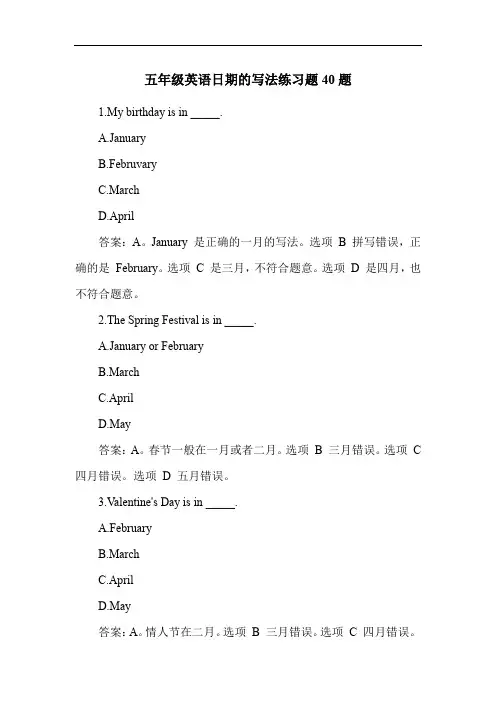
五年级英语日期的写法练习题40题1.My birthday is in _____.A.JanuaryB.FebruvaryC.MarchD.April答案:A。
January 是正确的一月的写法。
选项B 拼写错误,正确的是February。
选项C 是三月,不符合题意。
选项D 是四月,也不符合题意。
2.The Spring Festival is in _____.A.January or FebruaryB.MarchC.AprilD.May答案:A。
春节一般在一月或者二月。
选项B 三月错误。
选项C 四月错误。
选项D 五月错误。
3.Valentine's Day is in _____.A.FebruaryB.MarchC.AprilD.May答案:A。
情人节在二月。
选项B 三月错误。
选项C 四月错误。
选项D 五月错误。
4.Easter is usually in _____.A.March or AprilB.MayC.JuneD.July答案:A。
复活节通常在三月或者四月。
选项B 五月错误。
选项C 六月错误。
选项D 七月错误。
5.Mother's Day is in _____.A.MayB.JuneC.JulyD.August答案:A。
母亲节在五月。
选项B 六月错误。
选项C 七月错误。
选项D 八月错误。
6.Father's Day is in _____.A.JuneB.JulyC.AugustD.September答案:A。
父亲节在六月。
选项B 七月错误。
选项C 八月错误。
选项D 九月错误。
7.Independence Day of the United States is in _____.A.JulyB.AugustC.SeptemberD.October答案:A。
美国独立日在七月。
选项B 八月错误。
选项C 九月错误。
选项D 十月错误。
8.The first day of school is usually in _____.A.August or SeptemberB.OctoberC.NovemberD.December答案:A。
Valentine's_Day
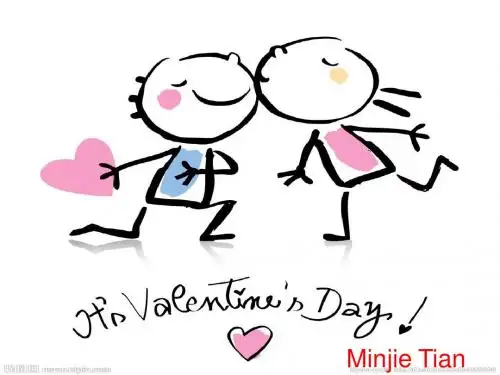
March 14 the White Day
• On this day, you will know if he loves you or loves to eat chocolate. Because if he loves you, he will give you white sweets to express his love to you. And then, you can share the white sweet and your sweet love together.
May 14 the Yellow & Rose Day
• You’re together for a time already, and does he really love you? And is he really your right man? It’s the time for you to tell out your feelings towards him directly. Don’t be shy, just be brave enough to give him the red roses to show your feelings towards him. Don’t hesitate!
• It is a traditional day for the lover to get engaged with silver rings. So you’d better to buy a pair of silver rings to wear on the fingers to witness your sweet love.
Development of Valentine’s Day
英语月份星期节日的缩写
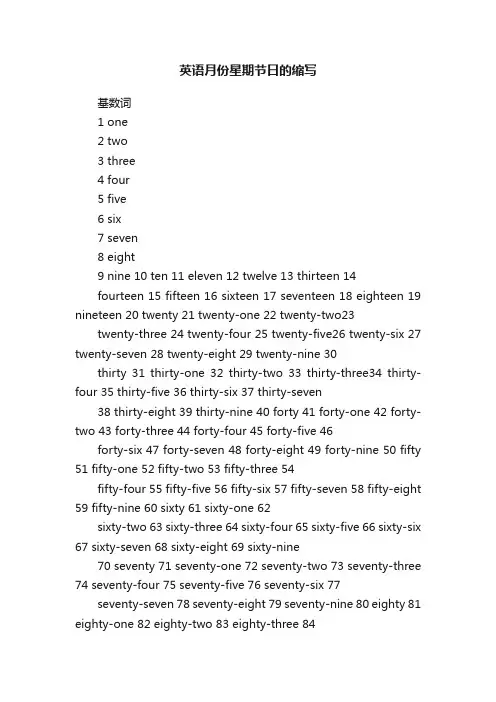
英语月份星期节日的缩写基数词1 one2 two3 three4 four5 five6 six7 seven8 eight9 nine 10 ten 11 eleven 12 twelve 13 thirteen 14fourteen 15 fifteen 16 sixteen 17 seventeen 18 eighteen 19 nineteen 20 twenty 21 twenty-one 22 twenty-two23twenty-three 24 twenty-four 25 twenty-five26 twenty-six 27 twenty-seven 28 twenty-eight 29 twenty-nine 30thirty 31 thirty-one 32 thirty-two 33 thirty-three34 thirty-four 35 thirty-five 36 thirty-six 37 thirty-seven38 thirty-eight 39 thirty-nine 40 forty 41 forty-one 42 forty-two 43 forty-three 44 forty-four 45 forty-five 46forty-six 47 forty-seven 48 forty-eight 49 forty-nine 50 fifty 51 fifty-one 52 fifty-two 53 fifty-three 54fifty-four 55 fifty-five 56 fifty-six 57 fifty-seven 58 fifty-eight 59 fifty-nine 60 sixty 61 sixty-one 62sixty-two 63 sixty-three 64 sixty-four 65 sixty-five 66 sixty-six 67 sixty-seven 68 sixty-eight 69 sixty-nine70 seventy 71 seventy-one 72 seventy-two 73 seventy-three 74 seventy-four 75 seventy-five 76 seventy-six 77seventy-seven 78 seventy-eight 79 seventy-nine 80 eighty 81 eighty-one 82 eighty-two 83 eighty-three 84eighty-four 85 eighty-five 86 eighty-six 87 eighty-seven 88 eighty-eight 89 eighty-nine 90 ninety 91 ninety-one92 ninety-two 93 ninety-three 94 ninety-four 95 ninety-five 96 ninety-six 97 ninety-seven 98 ninety-eight 99ninety-nine 100 one hundred第1 first 1st 第2 second 2nd 第3 third 3rd 第4 fourth 4th 第5 fifth 5th 第6 sixth 6th 第7 seventh 7th第8 eighth 8th 第9 ninth 9th 第10 tenth 10th 第11 eleventh 11th 第12 twelfth 12th 第13 thirteenth 13th第14 fourteenth 14th 第15 fifteenth 15th 第16 sixteenth 16th 第17 seventeenth 17th 第18 eighteenth 18th第19 nineteenth 19th 第20 twentieth 20th 第21 twenty-first 21st 第22 twenty-second 22nd 第23 twenty-third 23rd 第24 twenty-fourth 24th 第25 twenty-fifth 25th 第26 twenty-sixth 26th 第27 twenty-seventh 27th第28 twenty-eighth 28th 第29 twenty-ninth 29th 第30 thirtieth 30th 第31 thirty-first 31st第32 thirty-second 第33 thirty-third 第34 thirty-fourth 第35 thirty-fifth 第36 thirty-sixth第37 thirty-seventh 第38 thirty-eighth 第39 thirty-ninth 第40 fortieth 第41 forty-first第42 forty-second 第43 forty-third 第44 forty-fourth 第45 forty-fifth 第46 forty-sixth第47 forty-seventh 第48 forty-eighth 第49 forty-ninth 第50 fiftieth 第51 fifty-first 第52 fifty-second第53 fifty-third 第54 fifty-fourth 第55 fifty-fifth 第56 fifty-sixth 第57 fifty-seventh第58 fifty-eighth 第59 fifty-ninth 第60 sixtieth 第61 sixty-first 第62 sixty-second 第63 sixty-third第64 sixty-fourth 第65 sixty-fifth 第66 sixty-sixth 第67 sixty-seventh 第68 sixty-eighth第69 sixty-ninth 第70 seventieth 第71 seventy-first 第72 seventy-second 第73 seventy-third 第74 seventy-fourth 第75 seventy-fifth 第76 seventy-sixth 第77 seventy-seventh 第78 seventy-eighth第79 seventy-ninth 第80 eightieth 第81 eighty-first 第82 eighty-second 第83 eighty-third第84 eighty-fourth 第85 eighty-fifth 第86 eighty-sixth 第87 eighty-seventh 第88 eighty-eighth第89 eighty-ninth 第90 ninetieth 第91 ninety-first 第92 ninety-second 第93 ninety-third第94 ninety-fourth 第95 ninety-fifth 第96 ninety-sixth 第97 ninety-seventh第98 ninety-eighth 第99 ninety-ninth 第100 one hundredth 国家或国际节日元旦New Year' s Day --- Jan.1国际劳动妇女节International Working women' s Day (wornen's Day)--- Mar.8国际劳动节internatlonal Labor Day (May. Day)---May.1中国青年节Chinese Youth Day ---May.4国际儿童节International Children's Day (Children's Day)---June .1建军节Army Day ---August .1教师节T eachers Day---Sept.1国庆节National Dey---October.1中国传统节日春节the Sprlng Festival (New Yearls Day of the Chinese lunar calendar)农历正月初一元宵节(灯节)the Lantern Festival 农历正月十五清明节the Qing Ming Festival 四月五日前后端午节the Dragon-Boat Festiva 农历五月初五中秋节the MidAutumn Festival(the Moon Festival)农历八月十五重阳节the Double Ninth Festival 农历九月初九月份英文简写英文全称一月Jan. January二月Feb. February三月Mar. March四月Apr. April五月May. May六月June. June七月July. July八月Aug. Aguest九月Sept. September十月Oct. October十一月Nov. November十二月Dec. December注意:正规的英语中六月,七月,九月的缩写是4个字母美式英語是要以月/日/年英式英語是要以日/月/年中國語文是以年/月/日不可以用在句子的未尾,且月份的縮寫只有跟日一起用才能縮寫,單獨在句中是不能縮寫星期一:Mon.=Monday星期二:Tues.=Tuesday星期三:Wed.=Wednesday星期四:Thur.=Thurday星期五:Fri.=Friday星期六:Sat.=Saturday星期天:Sun.=Sunday。
英语数字时间总表
0nought;zero;O1one first第一2two second第二3three third第三4four fourth第四5five fifth第五6six sixth第六7seven seventh第七8eight eighth第八9nine ninth第九10ten tenth第十11eleven eleventh第十一12twelve twelfth第十二13thirteen thirteenth第十三14fourteen fourteenth第十四15fifteen fifteenth第十五16sixteen sixteenth第十六17seventeen seventeenth第十七18eighteen eighteenth第十八19nineteen nineteenth第十九20twenty twentieth第二十21twenty-one twenty-first第二十一22twenty-two twenty-second第二十二23twenty-three twenty-third第二十三30thirty thirtieth第三十32thirty-two thirty-first第三十一40forty fortieth第四十50fifty fiftieth第五十60sixty sixtieth第六十70seventy seventieth第七十80eighty eightieth第八十90ninety ninetieth第九十100one hundred(one)hundredth第一百101one hundred and one(one)hundred and first第一百零一156one hundred and fifty-six hundred and thirty-fourth第一百三十四200two hundred two-hundredth第二百300three hundred three-hundredth第三百400four hundred four-hundredth第四百500five hundred five-hundredth第五百600six hundred six-hundredth第六百700seven hundred seven-hundredth第七百800eight hundred eight-hundredth第八百900nine hundred nine-hundredth第九百1,000one thousand(one)thousandth第一千1,001one thousand and one thousand and first第一千零一1,300thirteen hundred;two thousand and thirty-fourth 第二千零三十四one thousand and three hundred ten thousandth第一万2,000two thousand(one)millionth第一百万(美作:billionth) 2,034two thousand and thirty-four billionth第十亿(美作:trillionth)6,502six thousand five hundred and two38,000thirty-eight thousand900,000,000nine hundred million45,672forty-five thousand six hundred 1,000,000,000 a milliard,one milliard and seventy-two(美作:a billion,one billion) 500,000five hundred thousand1,050,000,000one billion and fifty million 1,000,000one million10,000,000,000ten billion3,123,400three million,one hundred and twenty-200,000,000,000two hundred billion three thousand and four hundred1,000,000,000,000 a billion,one billion8,000,000eight million(美作:a trillion,one trillion) 47,000,000forty-seven million6,000,000,000,000six million million小数分数2.05 : two point nought five;two point O five1/2 : one-half;a half6.003 : six point nought nought three;1/3 : one-thirdsix point O O three3/4 : three-fourths78.12 : seventy-eight point one two1/5 : one-fifth2/5 : two-fifths百分比7/8 : seven-eighths100% : one hundred per cent1/10 : one-tenth;a tenth0.5% : point five per cent1/100 : one-hundredth;one per cent 0.46% : point four six per cent1/1000 : one-thousandth1/10000 : one ten-thousandth月份/星期21/2 : two and one half;two and a half一月January Jan.42/3 : four and two-thirds二月February Feb.三月March Mar.电话号码四月April Apr.119one one nine五月May May120one two oh六月June Jun.688six double-eight七月July Jul.5337five double-three seven八月August Aug.6512six five one two九月September Sep.97868nine seven eight six eight 十月October Oct.893493eight nine three four nine three十一月November Nov.737964seven three seven nine six four 十二月December Dec.62374881six two three seven four星期一Monday Mon.double-eight one星期二Tuesday Tue.星期三Wednesday Wed.1840年eighteen forty星期四Thursday Thu.1900年nineteen hundred星期五Friday Fri.1992年nineteen ninety-two星期六Saturday Sat.2000年twentyhundred星期日Sunday Sun.2003年twenty zero three时间表达方法4:00four o'clock 4 o'clock four04:00 )four in the morning 4 a.m16:00four in the afternoon 4 p.m9:00nine o'clock9 o'clock nine09:00 )nine in the morning9 a.m21:00nine in the evening9 p.m nine at night12:00twelve o'clock12 o'clock twelve12:00twelve in the morning,midday12 a.m00:00 )twelve at night midnight12 p.m12:15,00:15 a quarter past twelve twelve fifteen quarter past twelve a quarter after twelve02:25,14:25 twenty-five past two two twenty-five twenty-five minutes past two twenty-five after two11:30,23:30 half past eleven eleven-thirty half eleven half after eleven12:45,00:45 a quarter to one twelve forty-five quarter to one07:50,19:50 ten to eight seven fifty ten minutes to eight注意:年份一般用基数词表示,写时可以用阿拉伯数字。
美国节日(新年,林肯纪念日,情人节,华盛顿诞辰日)英文介绍
• •
st. valentine's day
(february 14)
St. Valentine's Day
(february 14)
• The earliest popular symbols of the St. Valentine's Day is cupid(爱神丘比特), the roman god of love, who is represented by the image of a young boy with bow and arrow.
New Year's Daw of a large fireworks display over the Chicago.
New Year's Day falls on January 1 and marks the start of a new year according to the Gregorian calendar. It marks the end of New Year's Eve celebrations in the United States and gives many Americans a chance to remember the previous year.
Washington's Birthday was first celebrated as a holiday in the District of Columbia in 1880. It was made a federal holiday in 1885. The holiday was originally held on the anniversary of George Washington's birth, on February 22. In 1971, this holiday was moved to the third Monday in February.
西方节日英文版
Valentine's Day(情人节)(February 14)St. Valentine's Day is an informal observance (非正式的庆祝) of a lover's holiday. Today, the observance has no connection with the many legendary (传说的) St. Valentines, and holds no religious significance. The day is observed with exchanges of love notes and cards, and other tokens(标志) of affection(感情), called valentines. The symbols of the heart and Cupid(丘比特) are common in cards, decorations of store windows,candies and other paraphernalia(随身物品). Traditional valentines were frilly(装饰的) sweet, and tender(温情的) affairs made of red and white paper and lace(花边) with cutouts(剪下的图样) and cupids. The custom of sending cards, giving candy, and other such tokens has caught a great deal of commercial enthusiasm(积极性). Many stores, for instance, decorate(装饰) seasonally, or a according to calendar holidays(日历). Valentine's Day is the first excuse for splashy(显眼的) valentine theme(主题) dominates stationery(文具) stores, candy stores, confectioneries(甜食制造业), and quite often drug stores where cards and candy are sold.Easter(复活节)(The first Sunday after the first full moon following the vernal equinox(春分))Easter is important for several reasons. Primarily(主要) it is a time for families to get together much like Christmas or Thanksgiving. They usually have a large meal and serve traditional(传统的) dishes such as baked ham(火腿). In addition, there is a commercial aspect(商业特征) of Easter. It is a time when manufacturers(制造商) of candy and chocolate can sell their products. They make chocolates in the shape of eggs and rabbits since those things are associated with(与……联系) spring and Easter. Finally, Easter is a religious holiday. Many Americans go to church on that day if they are Christians to celebrate the resurrection(耶酥复活) of Christ. Symbols(象征) which we see at Easter are chicks, flowers, eggs, baskets for children to dye Easter eggs and then to hide them. Other children look for the eggs and collect them in baskets. People often get new clothes for spring for around Easter time.Doll's Day 女儿节(初)The third of March is an exciting day for little Japanese girls. They know it as Doll's Day. On that day, any household which has a daughteraged between three and seven decorates the house with traditional dolls. They represent the royal family and members of the court. They are extremely delicate and finely dressed. The dolls may have been in the family for several generations, or they may have been newly presented to the daughter of the house, usually by the grandparents. The little girls do not merely look at the dolls displayed in the house. They themselves are dressed in elaborate kimonos, again of traditional design. Then their parents accompany them to the sacred shrines. After they come back home, special rice cakes are eaten. Doll's Day in Japan is for the girls, but the boys have their own turn later. Their festival occurs on May 5th, and this time the house are decorated with armour, emphasizing a traditional male roleApril Fool's Day 愚人节 (初)April Fool's Day is the first day of April. The sport of the holiday is to play silly but harmless jokes on family members,co-workers, and friends. A victim of one of these pranks is called an April fool. If one succeeds in tricking someone, one laughs and says,`April Fool`, and then the person who has been tricked usually laughs, too. This holiday originated in France. When the French first adopted the Gregorian calendar in 1564, some people continued to use the old calendar to celebrate New Year's Day on April 1.These people were called April Fools. The custom of playing tricks on this day became popularin France and then spread to many other countries. April Fool's jokes are as ingenious, humorous, or cruel as the people who perform them. Here are some typical pranks: __Telling somebody to call the zoo and ask to speak to Mr Fox. __Putting salt in the sugar bowl. __Setting the clock back an hour. __Saying to friends, 'Oh my! You have four holesin your coat-buttonholes! __Trying a string to a wallet and leaving the wallet in the middle of the sidewalk. When someone stops to pickit up, the pranker yanks it out of reach. In the United States today, April Fool's jokes are mostly played by children, who enjoy the holiday immensely.Notes: April Fool:在愚人节受骗的人. prank:玩笑;恶作剧. Trick:计谋;欺诈. Originate:开始;源自. cruel:残忍的. ingenious:坦率的. Popular:受欢迎的. Immensely:极大的;无限的. Humorous:幽默的. .Halloween(万圣日)(October 31)This is a holiday widely celebrated with different name in many countries .Although it originated(发源) as a religious holiday, it has lost its religious connections in the United States. It is now celebrated largely as a children's day, and many American children look forward to it for days and weeks beforehand. The orange pumpkin is harvested(收获) at this time of year and is hollowed(挖空) out, a funny face cut into it, and a candle placed inside as a decoration(装饰) in the window. City folks, nowadays, sometimes use paper pumpkins for decorations. Some years ago, the holiday was celebrated by dressing up in strange and frightening costumes(戏服) and playing tricks(戏弄) on one's neighbors and friends, such as ringing door bells, throwing bits of corn(谷物) on the window panes(窗格玻璃), and in other ways making minor disturbances(小骚扰).Note: originated(发源)harvested(收获)hollowed(挖空)decoration(装饰)costumes(戏服)tricks(戏弄)corn(谷物)panes(窗格玻璃)disturbances(小骚扰)Boxing Day 节礼日(初)In the English-speaking world, the day after Christmas Day has a special name. We call it Boxing Day.This makes it sound like a day on which everyone has a fight, but the name has nothing to do with the sport of boxing. It derives from the custom in former times of presenting servants and tradesmen with a Christmas box or gift. Here in Britain we still talk about giving the milkman or newspaper-delivery boy a Christmas box, when we mean a sum of money or present. The expression dates from the time when the money would have been put into an actual box.Boxing Day in modern times is a quiet day. Most people are recovering from the large meals they ate the day before. The children have new toys to keep them happy, and the adults are content to watch them play.Perhaps it would be a good idea of Boxing Day actually was made to honor that sport. Then, on other days, we could celebrate Football Day, Cricket Day, Hockey Day, and so on. There are probably enough different sports to allow each day of the year to have one to itself.Christmas Day 圣诞节(中)Christmas is a joyful religious (宗教的) holiday when Christians celebrate the birth of Jesus Christ. The Christmas story comes from the Bible (圣经). An angel appeared to shepherds (牧羊人) and told them that a Savior (救世主) had been born to Mary and Joseph in a stable in Bethlehem. Three Wise Man from the East (the Magic) followed a wondrous star which led them to the baby Jesus to whom they paid homage (表示敬意) and presented gifts of gold, frankincense, and myrrh. To people all over the world, Christmas is a season of giving and receiving presents. In Scandinavian and other European countries, Father Christmas, or Saint Nicholas, comes into houses in the night and leaves gifts for the children. Saint Nicholas is represented as a kindly man with a red cloak and long white beard. He visited houses and left gifts, bringing people happiness in the coldest months if the year. Anther character (人物) , the Norse God Odin, rode on a magical flying horse across the sky in the winter to reward people with gifts. These different legends (传说)passed the ages to make the present-day Santa Claus. Immigrant settlers brought Father Christmas to the United States. Father Christmas's name was gradually changed to Santa Claus, from the Dutch name for Father Christmas, which is Sinter Claus Although he has origins (渊源) in Norse and pre-Christian mythology (神话) , Santa Claus took shape in the United States. American gave Santa Claus a white beard, dressed him in a red suit and made him a cheery old gentleman with red cheeks and twinkle in his eye. Several American towns maintain the spirit of Santa Claus. The New England State of Connecticut has a Christmas village where "Santa" and his elves give out gifts. In New York, a small town called the North Pole was designed for Santa Claus. There is a post office, a church and a blacksmith shop, to repair the shoes of the reindeer. Santa Claus exists only in our imagination. But he, Saint Nicholas, and Father Christmas are spirits of giving, Christmas has been associated with gift giving since the Wise Men brought gifts to welcome the newborn Jesus Christ.Christmas Tree 圣诞节(中)One thing that most homes in America have at Christmas time is a Christmas tree, even in Hawaii where trees must be brought in by ship. But why a tree at Christmas? Trees have always been given a special place in the myths(神话), legends(传说), traditions, and religious beliefs (宗教信仰). Germany---The Christmas tree really started in Germany. Some historians think that the Christmas tree was a kind of Christian(基督教的 ) hope for spring to come soon. Why? Well, first of all, ChristmasDay comes right after the longest winter night, and people in the far north would soon expect the days to come longer. And, of course, Christ's birth was associated with (与......相联系)the bringing in new life. Second, an evergreen tree (one that stayed green all winter long) was eventually also connected by Christians with the idea of everlasting (永恒的)life, which Jesus Christ said he was bringing from God to Mankind. Paradise (天堂)tree--- In addition, Christians had for centuries honored Adam and Eve on December 24th by bringing into their house an evergreen tree the called the paradise tree. (Paradise was one name used in the Bible for the Garden of Eden(伊甸园), the home of the first human Adam and Eve.) And they decorated their Paradise Tree with red apples. (By Harvey M. Taylor, Ph.D. Special Days Special Ways, Peking University Press )NEW YEAR’S DAYS 新年(中)"Happy New year!""The same to you, and many more." The familiar greeting heard throughout the United States on January First has a counterpart in every land. The words may be different and the dates may vary, but New Year greetings everywhere express the hope for renewed life and happiness.Whether the New Year's Eve party is in a luxurious hotel ballroom or in modest home, it will be gay, noisy and glittery. The music will be loud and carefree, and there will be bright colors , festive foods, and high good spirits to make this last night of the year one of fun and frivolity. At celebrations in restaurants, clubs and shipboard salons, guests are given silly paper hats and noisemakers (n. 狂欢时时用以发出噪音的器物) and as the evening goes on no one remains a stranger. At midnight everyone joins hands and signs, "We'll take a cup of kindness yet, for Auld Lang Syne."Preparation for the party includes planning what one will wear. If it is a formal affair, men will wear tuxedos and the ladies will put on their most elegant gowns. And even small parties mean "dressing up." But if it is a masked ball(n.假面舞会), "dressing up" takes another form. The guests vie (vi.竞争) for the most original, exotic, dignity and appealing costume. Hidden behind a mask or domino. Dignity and care are cast aside, and not until unmasking at midnight must the party-goers discard the illusion of their changed personalities.Not everyone goes to a party, but almost everyone makes an occasion of New Year's Eve. A favorite place to see the old year out is New York City 's Times Square. Thousands of New Yorkers and tourists crowd thisfamous spot (at the intersection of Broadway and Seventh Avenue) and crane their necks to watch for "Happy New Year" to flash across the electronically controlled sign tract that circles the Allied Chemical Tower. When the moment arrives bedlam(n.喧闹声) breaks forth. Bells ring, whistles blow, people cheer with unrestrained exuberance(n.充溢).This chaotic scene is repeated in public squares throughout the country, but not at the same moment. Because of the four time zones in the United States the New Year comes to the central States one hour later, to the Mountain States two hours later, and finally to the Western States three hours after the Eastern States have noisily said good bye to another year. So by following the radio and television broadcasts everyone can enjoy the festivities in other parts of the country as well as their own.Then with the arrival of the new year, thoughts turn to the future-a future viewed optimistically and hopefully. Greeting cards and spoken messages convey wishes for health, wealth and long life. A new year allows a fresh start and New Year's resolutions abound.Grown-ups and children alike enthusiastically vow(v.发誓) to get rid of their bad habits and resolve to lead better lives. Children are apt(a.易于的) to write down their resolutions with solemn ceremony:"I resolve to stop teasing my sister.""I resolve to save part of my allowance""I resolve to hang up my clothes before I go to bed."To show their seriousness they sign their names and deliver the paper to a parent for safe-keeping. Adults make equally ambitious resolutions:"I resolve to stop smoking.""I resolve to lose weight.""I resolve to learn a new language."Despite the sincerity of the resolutions, no one seems surprised that the determination to "turn over a new leaf" disappears before the new year is well started.Although New Year's traditions in the United States stem from as many cultures as do the people themselves, they have gradually assumeda typical American flavor. The giving of gifts, for instance, an important part of Roman and Old English tradition, has all but disappeared. Instead, New Year's cards are exchanged among friends and relatives, and commercial firms combine greeting with advertisement of their products by distributing calendars and small trinkets. There are, of course, notable survivals still followed in their original form. Two of the most cherished came from Scotland: toasting from the wassail bowl and the ever-popular song, "Auld Lang Syne."The custom of visiting friends, relatives and neighbors on New Year's Day is one of the Old World traditions that have taken on a new form in the United States. It is called the Open House.An open house is just what the name implies: the front door is left open, inside there is a spirit of relaxed cordiality(n.热诚), and guests are free to arrive and leave when they like. Invitations may say simply, "come drink a New Year's toast with us."New Year's dinners with traditional holiday foods and drinks are customary with many families. It is a time to cement ties of kinship and to observe both faces of January--to be grateful for the blessings of the past year while looking forward to a brighter future..Spring Festival 春节(中)China's traditional festivals have evolved (演化,发展)through the centuries from past major events. For instance, long ago when people had a bountiful harvest, they gathered and celebrated their good fortune with gala performances(盛大的演出). When natural disasters struck, they offered sacrifices to the gods and their ancestors, hoping for a blessing (保佑). The change of the seasons, flowers in spring, and the bright moon in autumn could all arouse their longing for a more beautiful life. Thus, creative activities were held to signify these events. Gradually these activities developed into festivals.The most important festival in China is the Spring Festival. It is said that the Spring Festival evolved from an activity known as the Winter Sacrifice(祭品). It was a custom practiced by the people of primitive society.(原始社会)As the cold winter began to recede and the warm spring was about to begin, the people of an entire clan (家族)gathered together. They brought out their bounty from hunting, fishing and the field. They thanked the gods for the blessings of nature, including the mountains, rivers,the sun, moon and stars. They thanked their ancestors. Then they shared and enjoyed the sumptuous bounty of the land, sea, air and fields as they ate, danced and sang heartily.In the beginning, their activities had no fixed date. But usually it was held at the end of each winter. Gradually, through the years, it was celebrated at the end of the old year or the beginning of the new. With the changes and disintegration of primitive society, the form and content of the Winter Sacrifice also changed. Ultimately, it became a festival to bid farewell to the old year and welcome in the new year (辞旧迎新). So it came to be called the Spring Festival.All the traditional festivals in China are based on the Chinese lunar calendar(阴历). The Spring Festival marks the beginning of the Chinese Lunar New Year. In Chinese, we also say Guo Nian, meaning keeping off the monster of Nian.There are many legends about the origin (起源)of Nian. The most popular one is this. It is said that Nian was a fierce monster back in ancient times. It looked like a strong bull with head like that of a lion. Usually the monster stayed deep in the mountains and caught and ate other beasts. But during the winter, it could not find enough food. So it came out of its mountain lair(兽穴) and entered villages to eat whatever it could catch. Villagers became very frightened and moved away to escape the ferocious monster. But later the people found that even though it was fierce, Nian was afraid of three things: the red color, a bright flame, and a loud noise. After learning this, they figured out how to prevent Nian from entering their villages.Just before Nian came again, every household painted their door red and burned a fire in front of their door-ways. Besides, the people did not go to bed. Instead, they stayed up all night beating on things to make a loud noise. Ever since, Nian has never again come to villages.Thus, a tradition was established and the customs have been kept through the years. Later, the people found that bamboo could make a crackling sound when burned. In time, the noise of crackling bamboo was replaced with bang of firecrackers(鞭炮). This is how the Chinese people began to set off firecrackers for the Spring Festival. (By Dai Yirong, Excerpt of Cultural Background of China, China Radio International, World Publishing corporation.)National Holiday 感恩节(中)Thanksgiving Day is always celebrated on the fourth Thursday of November. It is the most traditional of American holidays. The first Thanksgiving was held in Massachusetts in 1621. After a year of great hardship, the Pilgrim (清教徒) colonists wanted to give thanks to God for their first harvest. They invited their Indian friends to join them in big feast. Today the holiday is still celebrated as a day for giving thanks. It is a day of family reunion and it is customary to invite friends to share the meal. In some large cities, there are carnival parades for children. In other cities, there are important football games that are played on Thanksgiving Day.In my family, we always go to my grandmother's house on Thanksgiving Day. All my aunts, uncles, cousins, nephews, and nieces gather for a family homecoming. We always invite some friends to join us. Everyone is glad to see everyone else and there is a very busy exchange of gossip. The women soon disappear into the kitchen to help my grandmother prepare the dinner. The men, meanwhile, settle down to watch a football game on television or to discuss business or politics. If the weather permits, some of the more athletic men go outside to play ball with the children. At about four o'clock we all sit down to dinner. My grandfather gives thanks for the blessings we have received and then he starts to carve the turkey. We always have the traditional dinner of stuffed turkey, cranberry sauce, apple cider, sweet potatoes, chestnuts, and pumpkin pie. After dinner, no one can move and we all sit around and talk, play word games, or tell jokes until it is time to go home. It is always difficult to leave because Thanksgiving Day is one of the few days of the year when the entire family gets together.Thanksgiving Day 感恩节(高)No other holiday that is today widely observed in North. America has such a long and curious history as Thanksgiving.Throughout the Bible, there are references to the Israelites setting apart days for special thanksgiving to the Lord. Such days were common in England before the reformation and afterwards figured in the lives of the Protestants. In 1872, February 27 was set aside as a day of thanksgiving for the Prince of Wales recovery from typhoid fever, for example.But these were only days of thanksgiving. The real, distinctively American Thanksgiving Day is a legacy of the Pilgrims- the English colonists, led by separatists form the Church of England- who arrived in America in December 1620 aboard the Mayflower and founded Plymouth Colony.During the winter after arriving in the New World, 47 of the 103 Mayflower passengers died, but the remainder did not lose hope. By spring, each family had a home, and all were planting grains they had brought with them and corn given them by friendly Wampanoag Indians. They were eating fish the Indians had taught them how to net, along with wild game from the woods.In gratitude for the plenteous harvest, Governor Bradford set aside December 13, 1621 (old Style calendar) for feasting and celebration.There was no specific day of thanksgiving set aside in 1622. But in 1623, Thanksgiving Day was so devoted to showing gratitude to God, rather than to social activity, that some authorities say it was the real beginning of Thanksgiving as we know it today. after the hard, severe winter of 1622-23, the Pilgrims planted seeds. Governor Bradford wrote that they hoped for a large crop, but suffered a drought from May till July.After discussing the situation with the worried colonists, Governor Bradford ordered a day of prayer and fasting, during which the Pilgrims were to humble themselves before the Lord.The crops were saved, and, after the harvest,“another solemn day was set apart for returning glory, honor and praise, with all thankfulness, to our Good God."During the following years throughout New England, there were specific days of thanksgiving-sometimes once a year, sometimes twice. Sometimes a year was skipped. The part of the day spent in religious services varied, at least partially in keeping with the colonists' and the preachers' assessment of just how much they had to be thankful for at that particular time.George Washington was inaugurated president of the United Stated on April 30, 1789, and a few months later issued his first proclamation. It had to do with Thanksgiving. In September, a few days before Congress adjourned, Rep. Elias Boudinot made a motion that the president be requested to recommend a day of prayer and thanksgiving for the many blessings of the Almighty God, and particularly for His allowing than to establish a government that would provide safety and happiness. The motion was carried, and President Washington proclaimed November 26, 1789, to be Thanksgiving Day. Washington included in his proclamation:“It is the duty of nations to acknowledge the providence of Almighty God, to obey His will, to be grateful for His benefits, and humbly to implore His protection and favor.The several presidents after Washington generally left to the governors of the states the decision about whether there should be a specified day for thanksgiving, and, if so, what day it should be. However, after the War of 1812, President James Madison did proclaim a special nationwide day of thanksgiving for peace.President Abraham Lincoln in the midst of the Civil War wrote the first national Thanksgiving Proclamation since George Washington's time, designating the last Thursday in November as Thanksgiving Day.Lincoln in 1864 issued another Thanksgiving Proclamation, and most U.S. presidents who followed him did the same. In 1938, Franklin D. Roosevelt ended his Thanksgiving message with Americans, in our deepest natures, in our very souls, like all mankind, turn to God. 'In God we trust.' "In 1952, Harry S. Truman included in his proclamation, "We are grateful for the privileges and rights inherent in our way of life, and in particular for the basic freedoms, which our citizens can enjoy without fear." President Dwight Eisenhower in 1958 ended his Thanksgiving Proclamation with these words:" Let us be especially grateful for the religious heritage bequeathed us by the Pilgrims, who after gathering their first harvest set apart a special day for rendering thanks to God for the bounties vouchsafed to them.Notes: Reformation:宗教改革。
Valentine's Day情人节(英文)
day
2.14 情人节
February has long been a month of romance. With the sweet smell of roses in the air, romantic films hit cinemas and love stories fill newspapers and magazines. 二月作为浪漫的月份由来已久。在这个时节,空气中弥漫着玫瑰花的芳香, 二月作为浪漫的月份由来已久。在这个时节,空气中弥漫着玫瑰花的芳香, 影院里放映浪漫的电影,而爱情故事充斥了各种报纸和杂志。 影院里放映浪漫的电影,而爱情故事充斥了各种报纸和杂志。
Flower Language
Different quantities -- different meanings
花语
1 rose: love at first sight,you are the only one 3 roses: I love you 5 roses: I love you very much 6 roses: I love you, I miss you 9 roses:I'll love you forever : 10 roses:You're pretty : 12 roses:"I love you" and I am grateful for your : presence 13 roses:Forever friends : 15 roses:I'm really sorry : 24 roses:You're always on my mind : 36 roses: I'll remember our romantic moments 99 roses: I'll love you till the day i die 100 roses: 100% love, I'm totally devoted to you 101 roses: Best of all, you're my one and only 365 roses: I love you every single day 999 roses: my love will last till the end of time
